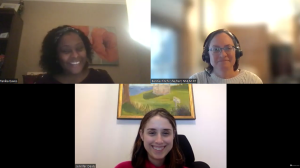Apr
22

Posted by benniefinch on April 22nd, 2024
Posted in: Blog, Member Spotlight, NLM Resources, Weekly Newsletter
Tags: Black Maternal Health, health disparities, Health Literacy, Healthcare workforce

Dr. Tanika Eaves
Dr. Tanika Eaves and Dr. Jennifer Dealy have combined their passions around Maternal Health and Mental Health, Respectful Maternity Care, and Attachment in some of their recent research interviewing perinatal care providers about their work with families. The researchers noted disparities in maternal health outcomes and that these are experienced at a much higher rate by BIPOC women and birthing persons. For their study, they focused on interviewing providers of color and those who serve families of color. The following post includes some of the themes of a conversation between Bennie Finch, Education and Outreach Coordinator for the Network of the National Library of Medicine in Region 7, Dr. Tanika Eaves, PhD., Assistant Professor of Undergraduate Social Work at Fairfield University, and Dr. Jennifer Dealy, PhD, Assistant Professor of Psychology at Albertus Magnus College. The conversation was held on January 16, 2024.

Dr. Jennifer Dealy
Drs. Eaves and Dealy met during their graduate education at the University of Connecticut in the Human Development and Family Science Program. As they thought more about the perinatal experience of birthing people, they also thought about how these experiences impact the relationship between the baby and the family.
One of the guiding templates for their work has been the Respectful Maternity Care (RMC) model. Dr. Dealy reports that initially this framework was meant to protect from harm, disrespect, and abuse but has shifted to more of a rights-based framework which calls for rights to respect, dignity, and culturally responsive care. An important component of this is having access to health information throughout the prenatal period, having questions and concerns addressed throughout, and being prepared for the birthing process.
Through interviews with frontline perinatal workers such as nutrition consultants, lactation consultants, nurses, doulas, midwives, parenting educators, home visiting nurses, mental health providers, and others, they asked these service providers, who typically spend much more time with birthing people than the typical healthcare provider, about their experiences.
Providers shared various experiences in the study related to a lack of RMC, such as lack of cultural representation and matching between providers and the community, patients not feeling comfortable asking questions about their bodies and their care, not feeling comfortable to ask to have their labor partner in the room, lack of information to allow for informed consent, and patients not feeling heard. Similar themes were indicated in this report from the CDC.
They also heard about tension across disciplines, such as frontline providers not feeling they have a voice, not receiving the same level of respect as other disciplines, and how this can be a barrier to advocating for their clients.
Dr. Eaves and Dr. Dealy both spoke about how they hope their work will support the current and future health care workforce, especially as it relates to respectful maternity care. They hope that by exposing students to health disparities and these frameworks, this will inform the practice of their current students as they enter health care and allied health fields and research. Their hope is to promote a value for respectful maternity care and interprofessional collaboration before students graduate.
“I think for us too as faculty members in higher ed we see you know sort of an opportunity because we have students in health and allied health study majors who have interest in maternity care and who are sort of aware and kind of blown away when they learn about these inequities and disparities, who have the passion.” – Dr. Tanika Eaves
The team also hopes to find ways to share the findings of their study and bring what they have learned to practitioners in a meaningful and interactive process to promote excellent care.
Our final discussion was around health literacy and health information access. As mentioned before, one of the investigators shared their experience and observation of birthing persons not knowing about their bodies and the childbirth process. This can impact knowing what questions to ask and what to expect during pregnancy, delivery, and postpartum and can be experienced by any birthing person. They also addressed the concern that some people may delay care or may even think they can rely on online searching and social media chat rooms instead of seeking health care and communicating with their healthcare providers. By embedding health literacy practices and making information more available throughout the perinatal period, people may be better prepared to interact with their healthcare provider and for the childbirth process.
Some resources to support pregnant people and those considering becoming pregnant are available through MedlinePlus in English and Spanish such as the Pregnancy Health Topic Page. There are also some great resources for Talking With Your Doctor and Making the Most of Your Appointment.
Another resource Have a Healthy Pregnancy also has some questions that can help in planning for prenatal medical appointments.
In addition, there are health information resources related to pregnancy available in multiple languages.
Finally, the CDC Hear Her Campaign provides materials and information in multiple languages, including a list of warning signs in English, Spanish, and the poster with warning signs is available in multiple languages.
Learning about the experiences of pregnant people can provide insight into improved practices and supporting health information access.
 If you would like to access the full conversation, you can listen or read the transcript at Maternal Health Conversation (umassmed.edu)
If you would like to access the full conversation, you can listen or read the transcript at Maternal Health Conversation (umassmed.edu)